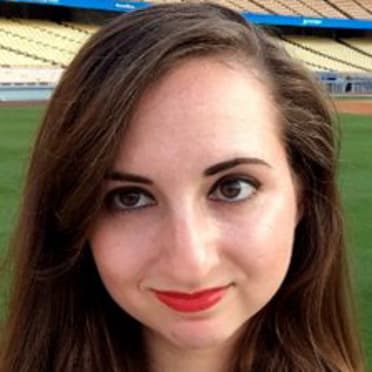'See Her Be Her' documents growth of women's baseball
WEST HOLLYWOOD, Calif. -- Women’s sports are having a moment. Just look at the soaring popularity of women’s college basketball and the WNBA, or the growth of the National Women’s Soccer League, or the establishment of the Professional Women’s Hockey League earlier this year. More and more, opportunities are arising for female athletes to play at high levels for sizable and invested audiences.
Is women’s baseball about to get a moment of its own?
A new documentary by Grassroots Baseball, “See Her Be Her,” offers a look at the undertold story of the contemporary women’s game as played all over the world. Directed by Jean Fruth and produced by Fruth and Jeff Idelson, former president of the National Baseball Hall of Fame and Museum, the film is set to premiere on MLB Network at 8 p.m. ET on Sunday, the day off between Games 2 and 3 of the World Series.
“See Her Be Her” highlights some of the landmark moments in women’s baseball, celebrating the female trailblazers of the AAGPBL, the Negro Leagues and even Little League, and it features some famous faces from the world of MLB. Its primary focus, however, is the 2024 Women’s World Baseball Cup, as seen through the lens of seven players: Libia Duarte (Cuba), Lillian Nayiaga (Uganda), Soyeon Park (Korea), Ayami Sato (Japan), Alli Schroder (Canada), Gabby Velez (Puerto Rico) and Kelsie Whitmore (United States).
The septet is a diverse group with a wide range of life experiences, but one united by a shared love of baseball and drive to compete.
“Our job was to make this film as best as we can make it and showcase these women and give them the visibility,” Fruth said following an advance screening of the film on Saturday. “And my hopes are, certainly, that this visibility creates more opportunities, not only for them, but for the younger generation that I see in the audience, all these kids and all these girls coming up, and that is my hope, and I think we're moving in the right direction.”
Among the screening’s attendees were baseball luminaries -- including former Major Leaguers Dave Winfield, Dallas Braden and Ed Sprague Jr., Baseball For All founder Justine Siegal and former Brewers president Wendy Selig-Prieb -- and young female baseball players, adorned in their teams’ caps and jerseys. Saturday was also the first time that Sato, Schroder, Velez and Whitmore, along with Team USA manager Veronica Alvarez, were able to see the film in its entirety.
“I'm so proud that [women’s baseball is] going to be able to be represented on national television during the World Series,” said Alvarez, who was named MLB’s first girls baseball ambassador in March. “And that it's going to be in the eyes of not just little girls, but of grown women and men and everyone, to see that we belong in this game, we are a big part of this game, we love this game, and that it should be open to anyone who chooses to play and be involved in it.”
One of the primary messages from the film and from Saturday’s Q&A session was that, for women’s baseball, this is just the beginning. As much as “See Her Be Her” shines a light on the thriving women’s baseball scene, it simultaneously explores the barriers that have kept it from growing to its full potential. That includes a societal infrastructure that pushes girls away from baseball and toward softball upon reaching a certain age -- and while softball is itself a wonderful and vibrant sport, it’s not the one all girls and women want to play.
Opportunities to keep playing baseball are scarce, though, and those who do stick with it often find the experience isolating and lonely at times; the Women’s Baseball World Cup, established in 2004, is a rare venue for women to play highly competitive baseball together.
At the youth level, MLB leads several programs focused solely on girls baseball, including the Trailblazer Series, a development event held every April for girls ages 12-13 and a variety of “MLB Develops” programs for high school athletes such as the Girls Baseball Elite Development Invitational; Girls Baseball Breakthrough Series; and MLB GRIT: Girls ID Tour, a showcase-style event designed for female athletes aged 18 and under. The coaching staffs are comprised of USA Baseball Women’s National Team players, former MLB players and current MLB/MiLB club-affiliated female coaches.
Numerous athletes within the MLB Develops girls baseball pipeline have gone on to make the USA Baseball Women’s National Team, and have played baseball and/or softball at the collegiate level.
The road may still be long, but there’s reason to believe that big things lie ahead for women’s baseball.
“There is so much forward movement, even though it doesn't seem overwhelming at times,” said Alvarez. “So it's, don't get frustrated by the fact that you don't see these big changes, for anybody in here that's doing their part in girls’ and women's baseball. It's, stay focused on your task, and when you pick your head up in five years, you're going to see this tremendous change.”
“I'm excited for the future of this game, because it's only going up,” said Whitmore, who in 2022 became the first woman to play in a professional league affiliated with Major League Baseball and has been a coach at many of MLB’s girls baseball events.
In the long run, the participants in “See Her Be Her” dream of a modern-day women’s professional baseball league. Those involved with the documentary can’t wait to see what impact it will have upon its release.
“It’s not just, ‘Aw, girls playing baseball,’” said Velez. “Like, no, we're bad-ass people. We're bad-ass humans. And Jeff and Jean and the whole team literally put that to the forefront and it was like, ‘Now you're going to pay attention, because look at how dope they are.’”
